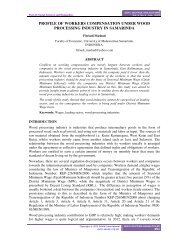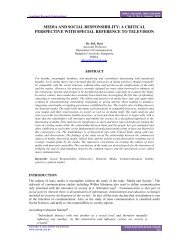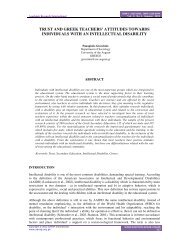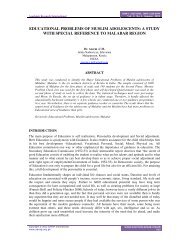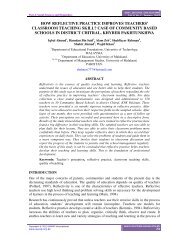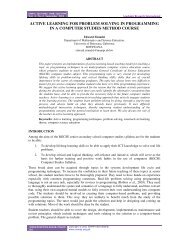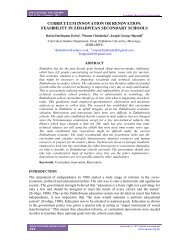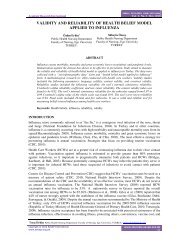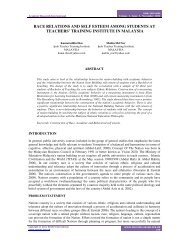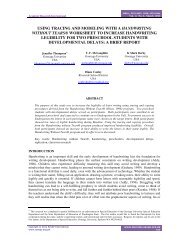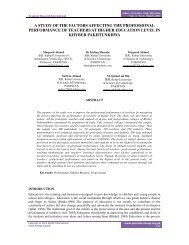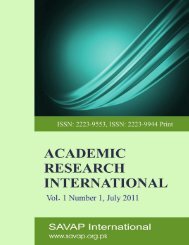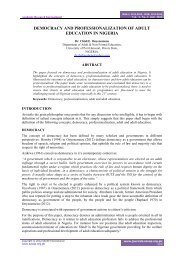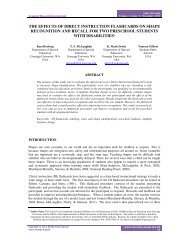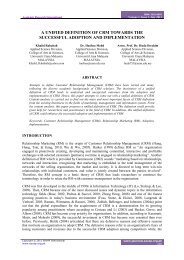Vol. 1(2) SEP 2011 - SAVAP International
Vol. 1(2) SEP 2011 - SAVAP International
Vol. 1(2) SEP 2011 - SAVAP International
Create successful ePaper yourself
Turn your PDF publications into a flip-book with our unique Google optimized e-Paper software.
Academic Research <strong>International</strong><br />
ISSN: 2223-9553<br />
<strong>Vol</strong>ume 1, Issue 2, September <strong>2011</strong><br />
others wising to establish secondary schools as well as regular supervision and inspection of these<br />
schools.(Federal Republic of Nigeria, 2004:4,22).<br />
Formal education was the modern innovation brought to Nigeria with the coming of the Christian<br />
missionary. During the monopoly of the church mission, it was religions based, intensely<br />
denominational and shallow in content. The schools in this era were maintained with grant from home<br />
churches, donations from group and individual outside the country, contributions by local Christian<br />
churches and parents. The colonial government was reluctant to get involved until 1882 when<br />
education ordinance provided for the financing of schools established by missions and private<br />
individuals. Even though the Christian mission were credited for their pioneering efforts in spreading<br />
western education, some shortcomings were highlighted like the establishment of mushroom and<br />
enviable schools and colleges, seeing education as an instrument for evangelism and gross misuse of<br />
fund among others.<br />
The relevance of Ashby commission of 1959 and the above shortcomings prompted government to<br />
take over schools to facilitate the process of rehabilitation, reconstruction and re-integration, after the<br />
civil war in 1970.<br />
But as the number of schools increased with more enrolment at the primary, secondary and tertiary<br />
levels, government discovered that the responsibility of funding and managing schools in Nigeria<br />
cannot be handled by them alone. This led to the policy statement in the National Policy on Education<br />
(1998) section 11 paragraphs 109 which states:<br />
‘‘Government’s ultimate goal is to make education free at all levels. The financing of joint<br />
responsibility of the federal, state and local governments, and the private sector. In this<br />
connection, government welcomes and encourages the participation of local communities,<br />
individuals and other organizations’’.<br />
From the above brief historical overview of education in Nigeria, one can realize that privatization of<br />
education has been a practice that is traceable to the traditional system of education and formal<br />
education was introduced by the Christian missionaries through private enterprise. (Adeogun and<br />
Aigboje; Alani (n.d) in Akpa, Udoh and Fagbamiye 2005:226-227, 43).<br />
Deregulation in the economic sense means freedom from government control. It is the removal of<br />
government interference in the running of a system. This means that government rules and regulations<br />
governing the operations of the system are relaxed or held constant in order for the system to decide<br />
its own optimum level through the forces of supply and demand. Deregulation allows enterprises and<br />
services to be restricted as little as possible as well as the withdrawal of government controls in the<br />
allocation of resources and the production of goods and services. (Akinwumi, Isuku and Agwaranze<br />
(2005) in Ajayi and Ekundayo 2008:214).<br />
According to Ekpo and Anuna(n.d) in Akpa, Udoh and Fagbamiye (2005:1) the concept of<br />
deregulation is synonymous with laissez-faire and private enterprises. Deregulation in economics and<br />
industries means non-intervention by government in individual or industrial monetary affairs. The<br />
doctrine is hinged on self-interest, competition and natural consumers’ preferences as important<br />
factors for enhancing prosperity and freedom as opposed to government’s absolute control of<br />
economic activities in a state. Deregulation as a new applicable concept in education means<br />
government diverting its interest in it and encouraging private sector participation in the management<br />
of the education system for the achievement of the pre-determined objectives and goals of education.<br />
Privatization is an important tenet in the deregulation process. It is the economic activity in the private<br />
sector as opposed to the public sector (federal, state and local government).<br />
Encarta (2004) as cited by Ekpo and Anuna (n.d) sees deregulation as a private enterprise by private<br />
individuals who hope to realize a profit from their activities and who bear any risk associated with<br />
those activities. Proponents of private enterprise believe that it promotes individual ingenuity and<br />
efficiency, particularly when such enterprises are free from government regulation. It is obvious that<br />
private sector involvement is necessary in order for our schools to be effective and efficient.<br />
Copyright © <strong>2011</strong> <strong>SAVAP</strong> <strong>International</strong><br />
www.savap.org.pk<br />
www.journals.savap.org.pk<br />
345



